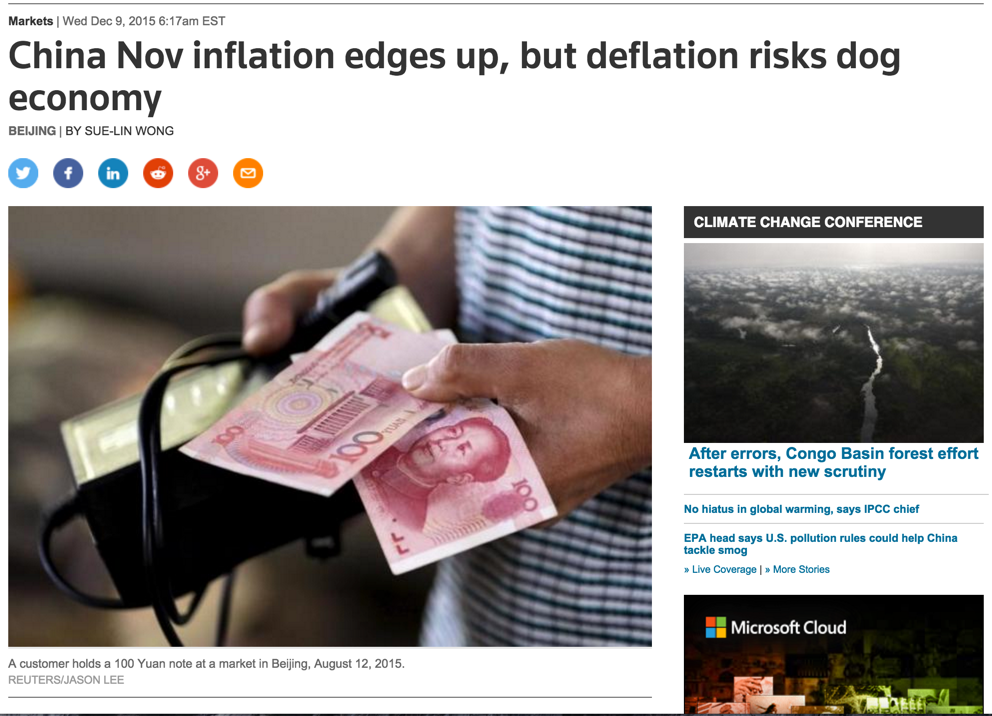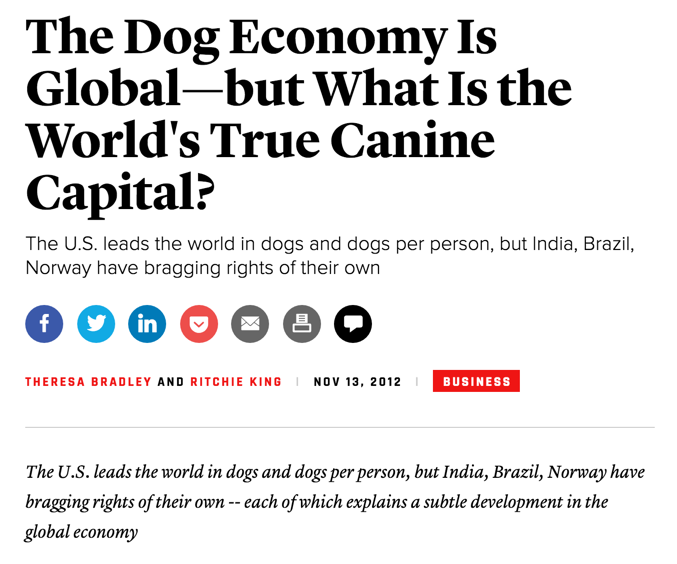Dog economy
« previous post | next post »
Sue-lin Wong, "China Nov inflation edges up, but deflation risks dog economy", Reuters 12/9/2015. When I saw that headline, I wondered whether dog economy was a Chinese idiom for "recession". Or could the story really be about the economic sector dealing with dogs?
Of course what's really going on is that risks is a plural noun and dog is a verb, meaning "to bother or pester persistently".
But there really is a dog economy, even if Chinese deflation isn't risking it: Teresa Bradley and Ritchie King, "The Dog Economy Is Global—but What Is the World's True Canine Capital?", The Atlantic 11/13/2015.
The obligatory screenshots:


Peter said,
December 9, 2015 @ 8:35 am
My first impulse was to read “dog economy” not as any specifically Chinese idiom, but as a piece of finance jargon like “bull marker”/“bear market”.
DWalker said,
December 9, 2015 @ 10:07 am
And what's the etymology or derivation of "dog" as a verb"
S Frankel said,
December 9, 2015 @ 11:05 am
"Dog" as a verb sounds like a metphor – to act like a dog, (to pursue someone's footsteps like a dog, for example).
What's the etymology of "dog" as a noun? There's a German word "Dogge," which means hound (and "Hund" means "dog," so: You ain't nothin' but a Dogge Hund), but the trail runs cold beyond that.
Jen said,
December 9, 2015 @ 11:34 am
The OED takes about 1000 words to explain that it doesn't have a clue, but thinks that the German and other forms come from English, not the other way round.
S Frankel said,
December 9, 2015 @ 11:40 am
Ah, thanks, Jen. I will, then, drop this suggestion on the floor where it should probably remain, unremarked: "Da gi" means "good dog" in Welsh.
prase said,
December 9, 2015 @ 2:35 pm
@S Frankel: First, why this order, and not "ci da", and second, why the mutation after "da"?
Fabian said,
December 9, 2015 @ 3:27 pm
@Peter:
My impulse was the very same – "dog economy" to me sounds like a bear market…
@S Frankel:
Not sure if you are a German native speaker (your last names sounds like it), but "Dogge" does not exactly mean "hound", but describes a group of different dog breeds.
Cheers,
Fabian
S Frankel said,
December 9, 2015 @ 3:53 pm
@Fabian. I also thought (briefly) that "dog economy" could refer to dogs as commodities, something I prefer not to think about. There may be some Franconian deep in my family history, but I'm not a native German speaker (for Americans, given names are better guide than the family name). "Hound" also refers to a groups of dog breeds and I started to look up the history of those and compare them with the group of "Doggen," and it gets very complicated very quickly, so i gave up.
@prase: I should have written that "dagi" is Welsh for "gooddog" (compounds, both). The reason for preposing the adjective (which is abnormal for Welsh) is to make the sound resemble "dog" or, more precisely "doggie." The reason for the mutation (gi from ci) is that nouns mutate after preposed adjectives, including the few adjectives that are normally preposed (hen gi [old dog]).
The "theory" (to dignify it by a term it scarcely deserves) is that "dagi" at some point formed a set compound and was adopted into English. The problems with this are: (1) there's no evidence (that I know of) for such a compound actually existing in Welsh [but I'm not an expert in middle, or any other kind of, Welsh). (2) There's no easy mechanism to get the correct vowel sound in English ('o' from 'a') (the few other loans with "a" in the tonic syllable preserve that sound in English) (well, there's only one I can think of offhand, "gwlanen" from "flannel;" but there are so few Welsh loans in English that it's hard to make generalizations).
Anyway, I'm going to stick with it, because why not? It's not like anyone has a better idea.
Nicholas Feinberg said,
December 10, 2015 @ 3:49 pm
Wiktionary suggests: "From Middle English dogge, from Old English docga (“hound, powerful breed of dog”), a pet-form diminutive of Old English *docce (“muscle”)…"
I'm not sure how much credibility to assign that, so take it for what it is.
Steve said,
December 10, 2015 @ 6:51 pm
This reminds me of an (IMO better) crash blossom turning on the same sense of "dog": "Financing challenges dog miners as industry churns through cycle."
Jonathon Owen said,
December 14, 2015 @ 3:05 pm
I think we can add the verb "dog" to the list of words that journalists use that nobody else uses.